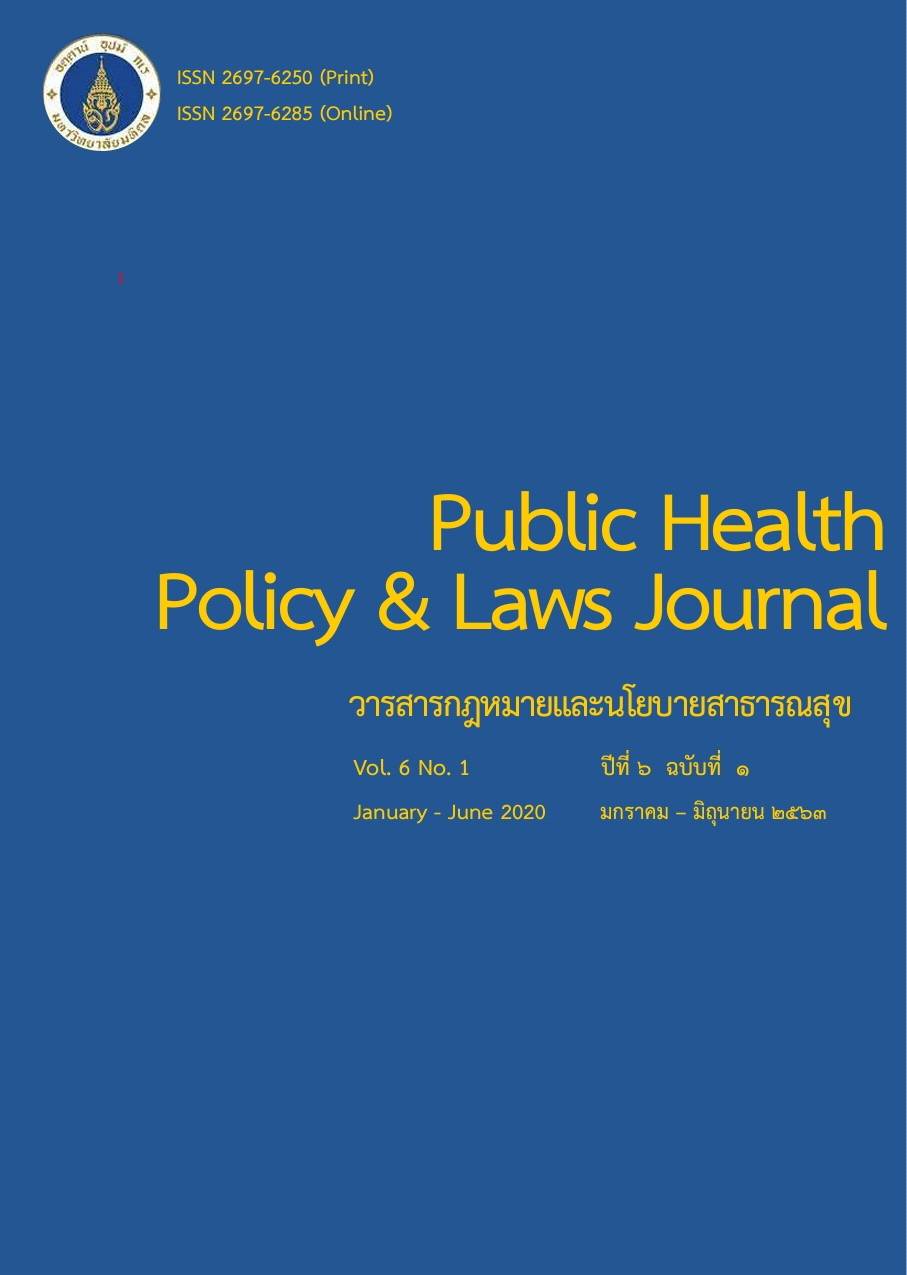Factors related to dietary supplement behavior consumption: A case study of undergraduate university students, in the northern Thailand
Keywords:
consumption behavior, dietary supplementAbstract
This research is a cross-sectional study on Dietary supplement consumption behavior, and factors related to dietary supplement consumption behavior of students in a Public Health program of a university in northern, Thailand. Samples were 321 students. Data were collected from questionnaires and analyzed by using percentage, mean and Chi-square.
The results showed that majority samples were female (85.7%) under the age of 22 years (68.8%), With average GPA between2.01-3.00 (70.1%), majority in Community hygiene discipline (46.7%) with monthly income of below or equal to 6,000 baht (54.5%) majority of samples had higher consumption of dietary supplements (58.6%). The attitude of dietary supplements with at a moderate level (46.3%). majority of samples were influenced by mass communication (53.6%), and had moderate consumption behavior (72.6%)
The factors associated with the consumption habits of dietary supplements were found to be revenue and influence from mass communication on consumption of dietary supplements. These factor were associated with a statistical significant intake of dietary supplements at the level of 0.05 (P-value = 0.047, 0.008, respectively). Results of this research can be used as the basis for the planning to educate and promote the attitude of proper dietary supplements or to provide behavioral modification activities, which would had to a people habits of dietary supplements consumption.
References
ธัญลักษณ์ นามจักรและปิยธิดา ปลอดทอง.(2557). มาตรการทางกฎหมายในการคุ้มครองผู้บริโภคด้านการโฆษณาผลิตภัณฑ์อาหาร. วารสารนักบริหาร, 34 (1) มกราคม-มิถุนายน 2557; 51-59
บรรจง พลไชย. (2559).การศึกษาทัศนคติ และพฤติกรรมการบริโภคผลิตภัณฑืเสริมอาหารของนักศึกษาพยาบาล มหาวิทยาลัยนครพนม. วารสารอาหารและยา. ฉบับเดือนมกราคม-เมษายน 2559. (51-57)
ปิยรัตน์ จิตรภักดี และคณะ.(2557).ปัจจัยที่มีความสัมพันธ์กับน้ำหนักตามเกณฑ์ส่วนสูงในเด็กนักเรียนชั้นประถมศึกษาตอนปลายโรงเรียนแห่งหนึ่งในจังหวัดชลบุรี. วารสารสาธารณสุขศาสตร์, 44(3) : 250-259
รุ่งนภา สิงห์สถิตย์. (2559). การศึกษาปัจจัยที่ส่งผลต่อพฤติกรรมการบริโภคผลิตภัณฑ์อาหารเสริมสุขภาพ ของนักศึกษามหาวิทยาลัยราชภัฏหมู่บ้านจอมบึง อำเภอจอมบึง จังหวัดราชบุรี. สาขาวิชาสาธารณสุขศาสตร์, มหาวิทยาลัยราชภัฏหมู่บ้านจอมบึง, จังหวัดราชบุรี.
รังสรรค์ เตี่ยวสกุล. (2560). ปัจจัยที่มีอิทธิพลต่อพฤติกรรมการบริโภคผลิตภัณฑ์เสริมอาหารของประชาชนวัยทำงาน ในพื้นที่อำเภอกะปง จังหวัดพังงา. วิทยาศาสตรมหาบัณฑิต, มหาวิทยาลัยราชภัฏภูเก็ต บัณฑิตวิทยาลัย, จังหวัดภูเก็ต.
เสกสรร วีระสุข และวรางคณา อดิศรประเสริฐ. (2557). พฤติกรรมผู้บริโภคผลิตภัณฑ์เสริมอาหารประเภท วิตามินในกรุงเทพมหานคร. มหาวิทยาลัยศรีนครินทรวิโรฒ, จังหวัดกรุงเทพมหานคร. Retrieved from https://ejournals.swu.ac.th/index.php/MBASBJ/article/view/4641
สำนักงานคณะกรรมการคุ้มครองผู้บริโภค.(2562).สิทธิของผู้บริโภค. Retrieved from https://www.ocpb.go.th/news_view.php?nid=9764
สำนักงานสถิติแห่งชาติ. (2561). พฤติกรรมการบริโภคอาหารของประชากร พ.ศ. 2560. Retrieved from https://www.nso.go.th/sites/2014/
Daniel WW. ( 2010) . Biostatistics: a foundation for analysis in the health sciences. 5thed. NewYork: John Wiley & Son
Hfocus เจาะลึกระบบสุขภาพ. (2560). ผลสำรวจพบคนไทย 70% เชื่อผิด คิดว่าอาหารเสริมเป็นสิ่งจำเป็นต้องกินประจำ.สำนักข่าวH focus เจาะลึกระบบสุขภาพ. Retrieved from https://www.hfocus.org/content/2017/02/13475
Downloads
Published
How to Cite
Issue
Section
License
Disclaimer and Copyright Notice
The content and information presented in articles published in the Journal of Law and Public Health Policy represent the opinions and sole responsibility of the respective authors. The editorial board does not necessarily agree with or assume any responsibility for the views expressed.
All articles, data, content, images, and other materials published in the Journal of Law and Public Health Policy are the intellectual property of the journal. Any individual or organization wishing to reproduce, distribute, or otherwise use the entirety or any part of such materials must provide proper citation.





